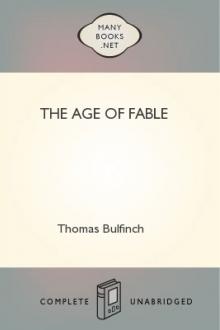Bulfinch’s Mythology, Thomas Bulfinch [love story books to read txt] 📗

- Author: Thomas Bulfinch
Book online «Bulfinch’s Mythology, Thomas Bulfinch [love story books to read txt] 📗». Author Thomas Bulfinch
(Loˈmond), Lake.
Lot(Lot), King, a rebel chief, subdued by King Arthur, then a loyal knight.
Lotis(Loˈtis), a nymph, changed to a lotus plant and in that form plucked by Dryope.
Lotus-Eaters(Loˈtus-Eaters), soothed to indolence; companions of Ulysses landing among them lost all memory of home and had to be dragged away before they would continue their voyage.
Love Eros issued from egg of Night(Love (Eros) issued from egg of Night), and with arrows and torch produced life and joy.
Lucan(Luˈcan), one of Arthur’s knights.
Lucius Tiberius(Luˈcius Ti-beˈri-us), Roman procurator in Britain demanding tribute from Arthur.
Lud(Lud), British king, whose capital was called Lud’s Town (London).
Ludgate(Ludˈgate), city gate where Lud was buried.
Luned(Luˈned), maiden who guided Owain to the Lady of the Fountain.
Lycabas(Lycˈa-bas), a turbulent sailor.
Lycaon(Ly-caˈon), son of Priam.
Lycia(Lycˈi-a), a district in Southern Asia Minor.
Lycomedes(Lyc-o-meˈdes), king of the Dolopians, who treacherously slew Theseus.
Lycus(Lyˈcus), usurping King of Thebes.
Lynceus(Lynˈceus), one of the sons of Aegyptus.
M Mabinogeon(Mab-i-noˈge-on), plural of Mabinogi; fairy tales and romances of the Welsh.
Mabon(Maˈbon), son of Modron.
Machaon(Ma-chaˈon), son of Aesculapius.
Madan(Maˈdan), son of Guendolen.
Madoc(Maˈdoc), a forester of King Arthur.
Mador(Maˈdor), Scottish knight.
Maelgan(Maelˈgan), king who imprisoned Elphin.
Maeonia(Mae-oˈni-a), ancient Lydia.
Magi(Maˈgi), Persian priests.
Mahadeva(Ma-ha-deˈva), same as Siva.
Muhammad(Ma-homˈed), great prophet of Arabia, born in Mecca, 571 AD, proclaimed worship of God instead of idols, spread his religion through disciples and then by force till it prevailed, with Arabian dominion, over vast regions in Asia, Africa, and Spain in Europe.
Maia(Maˈia), daughter of Atlas and Pleione, eldest and most beautiful of the Pleiades.
Malagigi the Enchanter(Mal-a-giˈgi the Enchanter), one of Charlemagne’s knights.
Maleagans(Ma-leˈa-gans), false knight.
Malvasius(Mal-vaˈsi-us), King of Iceland.
Mambrino(Mam-briˈno), with invisible helmet.
Manawyddan(Man-a-wydˈdan), brother of King Vran, of London.
Mandricardo(Man-dri-carˈdo), son of Agrican.
Mantua(Manˈtu-a), in Italy, birthplace of Virgil.
Manu(Maˈnu), ancestor of mankind.
Marathon(Marˈa-thon), where Theseus and Pirithous met.
Mark(Mark), King of Cornwall, husband of Isoude the Fair.
Marmora(Marˈmo-ra), Sea of.
Maro(Maˈro), see Virgil.
Marphisa(Mar-phiˈsa), sister of Rogero.
Marsilius(Mar-silˈi-us), Spanish king, treacherous foe of Charlemagne.
Marsyas(Marˈsy-as), inventor of the flute, who challenged Apollo to musical competition, and, defeated, was flayed alive.
Matsya(Matsˈya), the Fish, first avatar of Vishnu.
Meander(Me-anˈder), Grecian river.
Medea(Me-deˈa), princess and sorceress who aided Jason.
Medoro(Me-doˈro), a young Moor, who wins Angelica.
Medusa(Me-duˈsa), one of the Gorgons.
Megaera(Me-gaeˈra), one of the Furies.
Melampus(Me-lamˈpus), a Spartan dog. Or, the first mortal endowed with prophetic powers.
Melanthus(Me-lanˈthus), steersman for Bacchus.
Meleager(Me-le-aˈger), one of the Argonauts. See Althaea.
Meliadus(Mel-i-aˈdus), King of Lionesse, near Cornwall.
Melicertes(Melˈi-cerˈtes), infant son of Ino, changed to Palaemon. See Ino, Leucothea, and Palaemon.
Melissa(Me-lisˈsa), priestess at Merlin’s tomb.
Melisseus(Me-lisˈse-us), a Cretan king.
Melpomene(Mel-pomˈe-ne), one of the Muses.
Memnon(Memˈnon), the beautiful son of Tithonus and Eos (Aurora), and king of the Ethiopians, slain in Trojan War.
Memphis(Memˈphis), Egyptian city.
Menelaus(Men-e-laˈus), son of King of Sparta, husband of Helen.
Menoeceus(Men-oeˈceus), son of Creon, voluntary victim in war to gain success for his father.
Mentor(Menˈtor), son of Alcimus and a faithful friend of Ulysses.
Mercury(Merˈcu-ry), see Hermes.
Merlin(Merˈlin), enchanter.
Merope(Merˈo-pe), daughter of King of Chios, beloved by Orion.
Mesmerism(Mesˈmer-ism), likened to curative oracle of Aesculapius at Epidaurus.
Metabus(Metˈa-bus), father of Camilla.
Metamorphoses(Metˈa-morˈpho-ses), Ovid’s poetical legends of mythical transformations, a large source of our knowledge of classic mythology.
Metanira(Met-a-niˈra), a mother, kind to Ceres seeking Proserpine.
Metempsychosis(Me-tempˈsy-choˈsis), transmigration of souls—rebirth of dying men and women in forms of animals or human beings.
Metis(Meˈtis), Prudence, a spouse of Jupiter.
Mezentius(Me-zenˈti-us), a brave but cruel soldier, opposing Aeneas in Italy.
Midgard(Midˈgard), the middle world of the Norsemen.
Midgard serpent(Midˈgard serpent), a seamonster, child of Loki.
Milky Way(Milky Way), starred path across the sky, believed to be road to palace of the gods.
Milo(Miˈlo), a great athlete.
Milon(Miˈlon), father of Orlando.
Milton(Milˈton), John, great English poet, whose History of England is here largely used.
Mime(Miˈme), one of the chief dwarfs of ancient German mythology.
Minerva Athene(Mi-nerˈva (Athene)), daughter of Jupiter, patroness of health, learning, and wisdom.
Minos(Miˈnos), King of Crete.
Minotaur(Minˈo-taur), monster killed by Theseus.
Mistletoe(Misˈtle-toe), fatal to Baldur.
Mnemosyne(Mne-mosˈy-ne), one of the Muses.
Modesty(Modesty), statue to.
Modred(Moˈdred), nephew of King Arthur.
Moly(Moˈly), plant, powerful against sorcery.
Momus(Moˈmus), a deity whose delight was to jeer bitterly at gods and men.
Monad(Monˈad), the “unit” of Pythagoras.
Monsters(Monsters), unnatural beings, evilly disposed to men.
Montalban(Mont-alˈban), Rinaldo’s castle.
Month(Month), the, attendant upon the Sun.
Moon(Moon), goddess of, see Diana.
Moraunt(Mo-rauntˈ), knight, an Irish champion.
Morgana(Mor-gaˈna), enchantress, the Lady of the Lake in “Orlando Furioso,” same as Morgane Le Fay in tales of Arthur.
Morgane le Fay(Mor-ganeˈ le Fay), Queen of Norway, King Arthur’s sister, an enchantress.
Morgan Tud(Morˈgan Tud), Arthur’s chief physician.
Morpheus(Morˈpheus), son of Sleep and god of dreams.
Morte dArthur(Morte d’Arthur), romance, by Sir Thomas Mallory.
Mulciber




Comments (0)